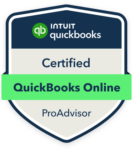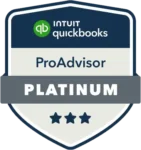Is your small business ready to wrap up the year smoothly? The end of the year is a critical time for small businesses, and preparing properly is key to closing the year on a strong note. Taking the right steps during this period helps you ensure that your finances are in order, operations are running smoothly, and you’re ready to tackle the new year confidently.
That’s why having a year-end preparation checklist for small businesses is so important—it helps you stay organized, avoid last-minute scrambling, and set the stage for growth.
In this blog, LUCI Financial Solutions has compiled a comprehensive 22-step checklist covering everything you need to wrap up your year successfully. We’ll start by reviewing key financial tasks, like running reports, reconciling accounts, and gathering tax documents. Next, we’ll dive into the operational side, such as backing up data, auditing inventory, and updating contracts. Finally, we’ll guide you through strategic planning for the new year, including setting goals and preparing budgets.
Following this checklist helps ensure that your business remains compliant with financial and legal obligations and gives you the peace of mind that you’ve covered all the critical tasks. Whether it’s preparing for tax season or updating business goals, this guide will walk you through each step.
Read through to the end to ensure you’re fully prepared to close the year strong and start the next one even stronger!
Step-by-Step Year-End Preparation Checklist for Small Businesses

Is your small business financially ready to close out the year? Year-end financial preparation is crucial to ensure your business remains healthy and compliant with legal requirements. You can start the new year by reviewing critical financial reports and organizing your finances.
In this heading, we will walk you through the most important financial management tips & tasks for your year-end checklist, including generating financial reports, analyzing cash flow, and reconciling accounts. Further, you’ll discover more about the operational, strategic, and legal compliance plans.
1. Run Standard Financial Reports
One of the most essential year-end tasks is running a profit & loss statement, balance sheet, and statement of cash flows. These documents provide a clear picture of your business’s financial health, allowing you to see exactly how your business performed over the past year. By generating these reports, you can compare this year’s data to previous years and understand whether your business is growing or facing challenges.
For example, the profit & loss statement shows how much profit you made over the year, while the balance sheet gives an overview of your assets and liabilities. Together with the cash flow report, these documents are essential for understanding your financial situation and planning for the future.
2. Analyze Cash Flow Statements
Cash flow is the lifeblood of any business, and analyzing your cash flow statement at year-end is vital in identifying trends and potential problems. A cash flow statement shows how money moves in and out of your business throughout the year—whether from sales, expenses, or investments.
By reviewing your cash inflows versus outflows, you can spot any problems that need attention. For instance, if cash outflows consistently exceed inflows, you may need to re-evaluate your expenses or find ways to increase revenue. Understanding your cash flow helps you plan for future financial needs and avoid surprises in the new year.
3. Reconcile Accounts Receivable
Another important step is reconciling accounts receivable. Accounts receivable represent the money your customers owe you for services or products they’ve received on credit. Before the year ends, it’s essential to ensure all outstanding payments are collected.
Review unpaid invoices and follow up with customers to clear these balances. Collecting outstanding payments improves your cash flow and ensures you’re not starting the new year with unpaid invoices. Properly reconciling accounts receivable also helps prevent discrepancies between your financial reports and actual income.
4. Review Vendor Information
As part of your year-end financial preparation, it’s a good idea to review your vendors’ details. Verify that all contact information, including phone numbers, addresses, and email details, is up to date. Accurate vendor records are critical for staying organized and ensuring smooth business operations.
Beyond updating contact details, year-end is also a perfect time to evaluate your relationships with vendors. Are you getting the best deals? Could you renegotiate pricing or terms? Looking for opportunities to renegotiate contracts or switch to more cost-effective suppliers can lead to long-term savings and improved vendor relationships.
5. Double-check Payroll & Benefits
Lastly, double-checking your payroll and benefits is crucial at year-end. Ensure that payroll taxes have been correctly calculated for the entire year and that all benefits, such as health insurance, retirement contributions, and employee bonuses, have been accounted for.
Reviewing payroll helps you avoid potential tax issues and ensures your employees receive the benefits they are entitled to. Accurate payroll and benefits calculations are also essential for filing taxes correctly and avoiding penalties in the new year.
6. Conduct an Inventory Audit
Conducting an inventory audit is essential at year-end, especially if your business holds products for sale. By counting and valuing your inventory, you ensure accurate financial reporting and identify opportunities for tax deductions. If you find unsold or obsolete inventory, you may be able to claim a deduction, which can reduce your taxable income.
Inventory management is crucial in understanding your business’s operational efficiency. An audit helps you determine which products are selling well and which aren’t, allowing you to make informed decisions about purchases or stock adjustments for the upcoming year. Keeping accurate inventory records supports both tax compliance and smoother business operations in the future.
7. Gather Tax Documents
As the year ends, gathering all necessary tax documents to prepare for tax filing season is essential. Start by compiling income records, including bank statements, credit card reports, and sales receipts. Additionally, gather any tax forms you’ve received, such as 1099s from contractors or W-2s for your employees.
Ensure that expense receipts are organized, as they will be needed to claim deductions. Keeping everything in one place—physically or digitally—will streamline the tax filing process and reduce the risk of errors. Proper documentation not only ensures compliance but also helps you maximize tax benefits.
8. Prepare for Tax Deductions
Identifying tax deductions is a powerful way to reduce your taxable income. Common deductions for small businesses include office supplies, marketing costs, utilities, and rent. You can also deduct business-related travel, meals, and software subscriptions.
It’s important to track these expenses throughout the year and ensure they are appropriately categorized and recorded. Work with an accountant to understand which expenses qualify for deductions and how to claim them. These deductions can significantly reduce your overall tax liability and improve your business’s financial health.
9. Finalize Depreciation Schedules
At the end of the year, ensure that all business assets are appropriately accounted for under depreciation. Significant assets, such as office equipment, machinery, or vehicles, are not fully expensed in the year they are purchased. Instead, their value is depreciated over several years.
Finalizing your depreciation schedules ensures you’re claiming the appropriate deduction for the year. This reduces your taxable income while accurately reflecting the diminishing value of your assets. Depreciation is a valuable tax strategy that helps you save money while maintaining accurate financial records.
10. Backup Important Data
Backing up your digital and physical records is one of the most important steps you can take at the end of the year. Whether it’s financial documents, contracts, or employee information, losing data can cause enormous setbacks for your business. Ensure all essential files are stored securely, both digitally (using cloud storage or external drives) and physically (in a secure filing system). Tools like QuickBooks can help back up accounting data so you won’t lose any critical financial records.
Data backups give you peace of mind, knowing that all critical information is safe and can be quickly recovered. Plus, this practice helps you stay organized when preparing for tax season or in the event of an audit.
11. Organize Important Documents
After backing up your data, the next step is to organize your physical and digital files. A well-organized filing system makes it much easier to access important documents during tax season and helps prevent paperwork from slipping through the cracks. Start by reviewing all of your business documents, such as contracts, invoices, and receipts, and sorting them into logical categories.
Organizing your files helps you stay on top of tax preparation and improves operational efficiency throughout the year. When files are easy to find, you can quickly resolve any issues or respond to client requests, keeping your business running smoothly.
12. Review IT Systems
Your business’s IT systems are the backbone of daily operations, so reviewing them at the end of the year is essential. Check if your software or hardware needs upgrades to meet your business’s needs. For example, top accounting software like QuickBooks should be up to date to ensure compatibility with the latest tax regulations. Similarly, outdated hardware can slow operations and lead to potential security risks.
Investing in updated IT systems improves efficiency and enhances data security, which is crucial for protecting sensitive business and client information. Upgrades will help your business operate more smoothly in the coming year.
13. Update Vendor & Client Contracts
Year-end is the perfect time to review and update vendor and client contracts. Contracts should always reflect the latest terms and agreements to avoid misunderstandings. Ensure that you’ve accounted for any changes in pricing, delivery schedules, or other key terms in your contracts.
Updating contracts is also an excellent time to evaluate your relationships with vendors and clients. Are you still getting the best deals? Do you need to renegotiate terms? Keeping contracts up to date helps protect your business and ensures you’re entering the new year on solid ground.
14. Audit Website & Online Presence
A solid online presence is critical for maintaining and growing your business. Before the year ends, thoroughly audit your website and social media profiles. Check for broken links, outdated content, or anything needing updating to align with your current business offerings.
Auditing your website ensures that your online presence reflects your business’s professionalism and engages potential clients. It also boosts your visibility, as an up-to-date, functional website helps improve search engine rankings.
15. Prepare Year-End Incentives for Employees

Your employees are the backbone of your business, and recognizing their hard work with year-end incentives can boost morale. Plan for bonuses, paid time off, or other incentives to reward your team’s efforts over the past year. Even small gestures like gift cards or personalized thank-you notes can go a long way in building a positive workplace culture.
Providing year-end incentives shows your appreciation for your team and motivates them to continue working hard in the new year. Happy employees are more productive, and investing in their satisfaction will ultimately contribute to your business’s success.
16. Set New Business Goals
Reflecting on your business’s achievements this year is a great starting point for setting new business goals. Did you hit your sales targets? Did you expand your client base? Use this information to define clear and measurable objectives for the following year. Whether it’s increasing revenue, expanding into new markets, or improving customer satisfaction, setting specific goals will help guide your business in the right direction.
New goals provide a sense of purpose and direction for you and your team. By reviewing your performance and setting realistic goals, you can start the year by focusing on what matters most.
17. Plan Next Year’s Budget
A well-planned budget is essential for managing your business finances effectively. Review last year’s financial data, including income, expenses, and cash flow, to create a detailed budget for the coming year. This should include allocating funds for necessary expenses like payroll, marketing, and inventory and planning for unexpected costs.
A strong budget keeps your business on track and helps ensure that you’re using your resources efficiently. This can lead to better decision-making and long-term financial stability.
18. Review Marketing Efforts
Year-end is the perfect time to review your marketing efforts. Analyze which campaigns were successful and which areas may need improvement. Did social media posts drive traffic? Were email campaigns effective? You can refine your marketing approach for the coming year by identifying the best strategies.
This review allows you to focus your marketing budget on the tactics that yield the highest return on investment, helping you grow your customer base and enhance brand visibility.
19. Evaluate Staffing Needs
Look closely at your staffing needs as part of your year-end planning. Did you have the correct number of employees to meet your goals this year, or do you need to adjust your team size? If your business is growing, you may need to hire additional employees. Alternatively, you may find opportunities to optimize your current staff through training or role adjustments.
Moreover, assessing staffing needs now ensures that you’re prepared to meet the demands of the new year. Keeping your team aligned with your business goals will enhance productivity and success.
20. Confirm Compliance with Regulations
Every business must follow legal and regulatory requirements, which can vary depending on the industry, location, and business structure. As the year comes to a close, it’s crucial to confirm that your business is meeting all necessary regulations, including licenses, permits, and labor laws.
Review your local, state, and federal requirements to ensure nothing is overlooked. This could include ensuring you have the proper business licenses, adhering to health and safety regulations, and following employee wage and hour laws. Missing any of these legal requirements can result in penalties, fines, or even the suspension of your business license. Taking the time to verify compliance at year-end helps avoid unnecessary legal issues and keeps your business running smoothly.
21. Prepare for Upcoming Tax Deadlines

Preparing for tax deadlines is an important part of staying compliant and avoiding penalties. Each year brings businesses a series of tax deadlines, including quarterly estimated tax payments, payroll tax filings, and income tax deadlines. Missing these deadlines can lead to hefty penalties and interest charges.
To avoid rushing at the last minute, review the tax deadlines for the upcoming year and start preparing your documents early. Ensure that all receipts, invoices, payroll records, and expense reports are organized and ready to go. Accounting software like QuickBooks can help keep everything in order, making it easier to submit your taxes on time.
Additionally, monitoring any changes to tax laws can help you take advantage of new deductions or credits while ensuring your business is compliant with current tax obligations.
22. Consult with an Accountant
If there’s one thing every small business should do at the end of the year, it’s scheduling a consultation with an accountant or tax advisor. An accountant can help review your year-end financials and ensure that all income, expenses, and deductions are accurately recorded. They can also help you strategize for the upcoming tax season, ensuring you’re maximizing tax-saving opportunities like depreciation and deductions.
A tax advisor can offer valuable insight into more complex financial situations, such as handling multi-state taxes, navigating an IRS audit, or preparing for a significant business purchase that could impact your taxes. Regular consultations with an accountant keep you informed, help minimize tax liability, and ensure your business complies with all legal and tax obligations.
In Conclusion:
As the year comes to a close, following this year-end preparation checklist is essential to ensuring your business is organized and ready for the upcoming year. From reviewing finances and backing up critical data to setting new business goals and preparing for tax deadlines, each step helps you wrap up the year smoothly and avoid unnecessary stress.
Starting your preparation early gives you ample time to address potential issues, improve operations, and plan for success. At LUCI Financial Solutions, we specialize in helping small businesses manage their bookkeeping, stay compliant, and maximize tax benefits. Let us help you streamline your year-end tasks and set your business up for a prosperous new year!











